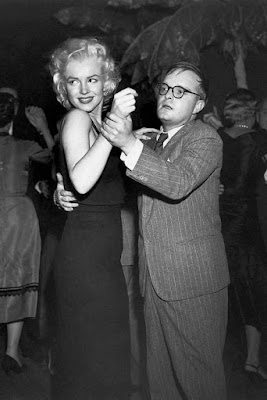I've written before about a link between Alabama and Marilyn Monroe, a very tenuous one via photographer John Vachon. You can read about it here. In this post let's examine a connection that's a bit more solid. Sort of....
Truman Capote's relationships to Alabama are well known. Although born in 1924 in New Orleans to parents who were both from our state, he moved to New York with his mother in 1931. During that decade he spent long periods with relatives in Monroeville, include a three-year stretch. His cousin Sook would later appear in some of his writings, as he would turn up as Dill in his friend Harper Lee's To Kill a Mockingbird.
Capote's Alabama days would appear in such writings as the novel The Grass Harp and stories "A Christmas Memory" and "The Thanksgiving Visitor." One of his best known works, however, would be influenced by both his time in New York City and family memories--the short novel Breakfast at Tiffany's first published in the November 1958 issue of Esquire. In it the unnamed narrator, a writer, tells us about his encounters with Holly Golightly, a neighbor in his apartment building and the other people in her life.
The piece was filmed in 1961 with Audrey Hepburn as Holly and George Peppard as the writer, now named Paul Varjak. Hepburn was nominated for a Best Actress Oscar, one of five the film received. Oscars were awarded for Best Original Score and the song "Moon River". The movie has become a romantic classic.
Although the shy Hepburn made the outgoing Holly a memorable character, she was not Capote's choice for the role. He wanted Marilyn Monroe. The screenplay by George Axelrod was first tailored for Monroe, but her advisor Lee Strasberg told her the character was too much like a prostitute--Capote called Holly an American geisha--and she turned it down. The part was also offered to Shirley MacLaine; she, too, didn't want it. The prim Hepburn got the part and made it her own. Capote felt betrayed by Paramount Studios, which had purchased the film rights.
Speculations around the "what ifs" of Hollywood casting are always fun. What if George Raft had accepted the offer to play Sam Spade in the 1941 Maltese Falcon, and Humphrey Bogart had missed out? What if Monroe had played Holly?
Apparently Capote put a lot of his mother into the character of Holly. Lillie Mae and his father Archulus Persons divorced when he was four. She later left Alabama for New York City and married Jose Capote, who would adopt Truman while they all lived on Park Avenue. There are striking similarities between the beautiful, mercurial Lillie Mae and the beautiful and mercurial Holly. The character is from the rural South--Texas--and her real name as revealed late in the book is Lulamae. There are other similarities between the lives of real people in Capote's early life and fictional characters in the book.
Capote and Monroe were introduced early in her career by film director John Huston. The writer remained bitter about Paramount's casting of Hepburn. He called the movie a "mawkish Valentine" that "made me want to throw up." Capote further declared, "It's the most miscast film I've ever seen." All of this bile despite acknowledging, "Audrey is an old friend, and one of my favorite people, but she was just wrong for that part." Years later talk of a remake surfaced, and Capote said Jodie Foster would be good for the part--another "what if" of Hollywood casting.
Something about Monroe's combination of intelligence, sexiness and yet child-like emotions made her seem right for Holly in Capote's mind. And after all, he wrote the book. Monroe once gave him a teddy bear with "I love you" on it. Near the end of his life he returned the favor and wrote a profile of the actress for Interview magazine entitled "A Beautiful Child."
The photographs below were taken in 1955 at El Morroco, one of Manhattan's most popular nightclubs from the 1930's until the late 1950's.
Some quotes and other information above came from the following two books:
Clarke, Gerald. Capote: A Biography. 1988, pp. 269, 516
Schultz, William Todd. Tiny Terror: Why Truman Capote [Almost] Wrote Answered Prayers. 2011, pp. 55,58, 131





No comments:
Post a Comment